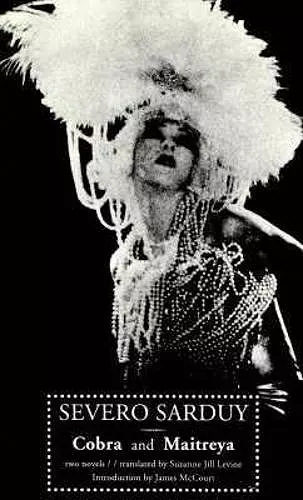Cobra
And, Maitreya
Severo Sarduy author Suzanne Jill Levine translator James McCourt editor
Format:Paperback
Publisher:Dalkey Archive Press
Published:22nd Dec '05
Currently unavailable, our supplier has not provided us a restock date

The late Severo Sarduy was one of the most outrageous and baroque of the Latin American Boom writers of the sixties and seventies, and here bound back to back are his two finest creations. Cobra (1972) recounts the tale of a transvestite named Cobra, star of the Lyrical Theater of the Dolls, whose obsession is to transform his/her body. She is assisted in her metamorphosis by the Madam and Pup, Cobra’s dwarfish double. They too change shape, through the violent ceremonies of a motorcycle gang, into a sect of Tibetan lamas seeking to revive Tantric Buddhism. Maitreya (1978) continues the theme of metamorphosis, this time in the person of Luis Leng, a humble Cuban-Chinese cook, who becomes a reincarnation of Buddha. Through Leng, Sarduy traces the metamorphosis of two hitherto incomparable societies, Tibet at the moment of the Chinese invasion, and Cuba at the moment of revolution. Transgressing genres and genders, reveling in literal and figurative transvestism, these two novels are among the most daring achievements of postmodern Latin American fiction.
“Severo Sarduy has everything. . . . So brilliant, so funny, and so bewilderingly apt in his borrowings, his derivations, as well as in his inventions, his findings, he leaves one breathless, like a shot of rum." —Richard Howard
“Sarduy is the master of wordscapes that dip, shake, and explode. But if Cobra is a magical juggling act, of image balancing dangerously upon image, the translation is as remarkable as the book itself. Levine has managed to snare Sarduy’s sense of play, all his conundrums and fabulations, and a good many of his Spanish puns, with a gorgeous transference of rhythms from one language to another.” —Jerome Charyn, New York Times Book Review
“In Severo Sarduy’s Cobra, the alternation is that of two pleasures in a state of competition; the other edge is the other delight: more, more, still more! one more word, one more celebration. Language reconstructs itself elsewhere under the teeming flux of every kind of linguistic pleasure. Where is this elsewhere? In the paradise of words. Cobra is in fact a paradisiac text, utopian (without site), a heterology by plenitude: all the signifiers are here and each scores a bull’s-eye; the author (the reader) seems to say to them: I love you all (words, phrases, sentences, adjectives, discontinuities: pell- mell: signs and mirages of objects which they represent); a kind of Franciscanism invites all words to perch, to flock, to fly off again; a marbled, iridescent text; we are gorged with language, like children who are never refused anything or scolded for anything or, even worse, ‘permitted’ anything. Cobra is the pledge of continuous jubilation, the moment when by its very excess verbal pleasure chokes and reels into bliss.” —Roland Barthes, The Pleasure of the Text
"Cobra is composed of jewel-like sentences that unfold like paper origami in convoluted proliferation. . . . Maitreya is one of the most radiant texts I have ever read, and the translation by Suzanne Jill Levine appears as seamless as a single ocean wave, spilling us from high elegance to low camp and back again without pause." —Bruce Benderson, Cups
"Hypnotic, poetic and challenging." —Gay Times
"Maitreya [is] a mesmerizing literary mosaic fusing the memories of a Caribbean sense of place with a fluid existential state where transmigration is commonplace." —Juana Ponce de Leon, Voice Literary Supplement
"Maitreya'soutrageous characters maneuver through endless passages and trapdoors, as if in a 'Tibetan Book of the Dead' recited by saucy drag queens. The dialogue can be as sharp as that of divas speculating cock size, but the sentences are sometimes as ornate as the spaces his characters inhabit, rambunctious as their makeup." —Lawrence Chua, Voice Literary Supplement
"Sarduy rendered the epiphany of the body luminous, where the pleasure of the void meets the furious fire of the world." —Washington Post Book World
ISBN: 9781564780768
Dimensions: 230mm x 141mm x 20mm
Weight: 394g
273 pages